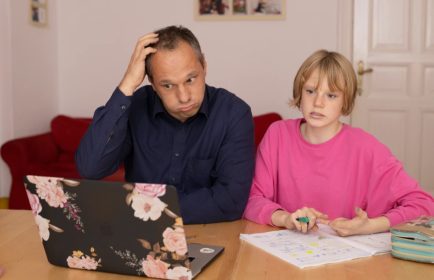Postnatal depression (PND) is surprisingly common, affecting at least one in eight new mums. Symptoms of PND can include feeling low, tired and anxious, and changes to eating and sleeping patterns. Treatment for PND usually involves antidepressants, counselling or cognitive behavioural therapy (CBT), or a combination of treatments. Postnatal depression (PND) is sometimes confused with the baby blues. The baby blues are when you feel moody, weepy, tired or anxious during the first week after giving birth. These feelings will usually pass within a few days.
However, unlike the baby blues, PND is an illness that is unlikely to get better quickly, and without help. The sooner you recognise that you have PND, and get the support that you need, the less likely it is to become a severe or long-term problem. About one in eight mums in the UK seeks help from their GP for PND, so it is very common. And as some women don’t seek help, or don’t acknowledge that they have PND, the true rate is likely to be even higher than this.
You are more likely to be vulnerable to PND if you have challenges in your life such as money worries, or relationship problems. The signs and symptoms of PND are different for every mum. Your friends or family may spot the signs before you do, but you may feel:
- sad or low
- unable to enjoy anything
- extremely tired, with no energy
- hopeless
- a sense of guilt
- lacking in appetite
- miserable
- tearful
- anxious
Most mums have at least one of these feelings, some of the time. It’s normal to have good days and bad days. But if you’re feeling these symptoms on most days, or much of the time, and they don’t get better, you could have PND. PND often develops within the first few months after giving birth, particularly in the first five weeks. But it could start at any time in the first year. You may have been really enjoying looking after your baby before depression crept up on you. If you were depressed while you were pregnant, your baby’s arrival may not have helped to lift your depression. Experts don’t fully understand why some women become depressed and others don’t. It’s likely to be for a few reasons, rather than just one cause. You could be vulnerable to depression with your second baby, even if you were fine with your first, or vice versa.
Sometimes, the things you have to face every day just get on top of you, and make it harder for you to look after yourself, rest and eat well. Certain circumstances may make it harder for you to cope, such as if:
- You have been depressed before, or have had problems with your mental health, or were depressed during a previous pregnancy.
- You don’t have a supportive partner, or have no family or friends living nearby.
- You’re having money, housing, work or relationship problems.
- You had a difficult labour, and health problems afterwards.
- Your baby was born prematurely, or is unwell.
- You are finding it difficult to breastfeed.
- Sad memories have been stirred up after your baby was born, such as the death of one of your parents.
With help, you will get better. Your GP or health visitor will want to support you, so that you can look after yourself and your baby well. Be reassured that having PND does not mean that you are a bad mother, or that you will have your baby taken away from you. If you have mild PND, your GP may suggest self-help strategies, and recommend a book that could help. If you have moderate to severe PND, you may be treated with:
- Though talking to your partner or a friend can help, they may find it difficult to understand what you are going through.
- Your GP may be able to refer you to a support group, counsellor or psychotherapist. She also may be able to arrange cognitive behavioural therapy (CBT) or interpersonal therapy (IPT). CBT can teach you coping strategies, while IPT explores whether problems in your relationships with others may be contributing to your depression.
- Unfortunately, waiting lists for these therapies tend to be long in many areas of the UK. Some charities can put you in touch with a trained volunteer who is used talking to mums with PND.
- If your PND is more severe, you may be referred to a mental health team, which is likely to include specialist nurses, as well as a psychologist or psychiatrist.
Antidepressants balance the chemicals in your brain. They raise levels of the hormone serotonin to lift your mood, help you to sleep, and make you feel less irritable. Between five and seven in 10 women who take antidepressants find that their PND symptoms ease within a few weeks of starting treatment. The first few tablets will make no difference, but after about two weeks to four weeks of taking them, you should begin to feel better. Antidepressants don’t always work, and may cause side-effects. Though they are not addictive, very occasionally, a person can become dependent on them.
Tricyclic antidepressants (TCAs) are considered to be safe to take if you are breastfeeding. Nortriptyline or imipramine are the TCAs that are usually recommended. Other commonly prescribed antidepressants for PND are selective serotonin reuptake inhibitors (SSRIs), including:
- fluoxetine (Prozac)
- sertraline (Lustral)
- paroxetine (Seroxat)
Antidepressants may pass into your breastmilk, though in very small amounts. Paroxetine and sertraline are often recommended over fluoxetine for breastfeeding mums, as smaller amounts of these drugs pass into breastmilk. If your baby seems sleepy or irritable after you have taken antidepressants, talk to your GP. Many mums who take antidepressants breastfeed because it improves their confidence and strengthens their bond with their baby. Feeling close to your baby can help you to tackle PND. Talk to your doctor to get a clear understanding of the risks and benefits involved in taking antidepressants if you are breastfeeding.
Sleep or rest whenever possible. If someone is able look after your baby for a couple of hours, put on some soothing music, have a warm drink, and relax. Try to nap when your baby is sleeping, and forget your to-do list for a while. With all the new demands on your body, eating well is important. Try not to go for long periods without eating, to avoid a dip in your blood sugar levels. Food fuels your energy and immune system, so a balanced diet will prevent you from becoming tired and feeling run down. It may be the last thing you feel like doing, but exercise will help you to feel better in mind and body. You could join an exercise class, or your GP may refer you to a personal trainer or an exercise scheme.
If it’s a struggle to get started, try to keep your goals manageable. Just going for a walk with your baby can help to lift your mood. If you did yoga or Pilates classes while you were pregnant, you could go along again now. Having a baby can be isolating, but if you have PND, you may feel particularly alone. Joining a baby massage group at your local children’s centre or GP surgery will help you to meet other mums. It may also help you to bond with your baby. Taking care of yourself and your baby are the most important things. Try not to load yourself up with tasks that aren’t essential. Leave any big decisions for when you’re better, and be realistic about what you can achieve. Try to treat yourself once in a while.
It can be hard for those closest to you to understand how awful you’re feeling. But they have an important part to play in helping you to get better. Tell them what you are going through and give them any information you have about PND. Your partner may also be depressed, and understanding how to support you could help him to feel better, too. Ask loved ones for help, because practical support, such as helping around the house or preparing food, can go a long way towards lifting your mood. Just an hour or so of them babysitting, so you can rest or have time alone or with your partner, will help to refresh you.
We don’t know. Some doctors may prescribe antidepressants immediately after the birth if you are at high risk of PND. Oestrogen therapy may be considered by your doctor if you have severe depression. Take care of yourself while you’re pregnant, try to reduce your stress levels, and accept any help that’s offered. The more support you have during your pregnancy, the stronger you are likely to feel when you have your baby. If you’ve had PND before, or felt depressed during pregnancy, tell your GP, so you can be treated sooner.
Original article: https://www.babycentre.co.uk/a557236/postnatal-depression-pnd#ixzz5X1BfjKml































Comments